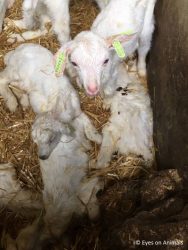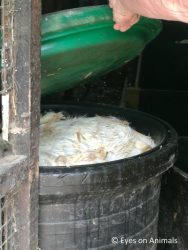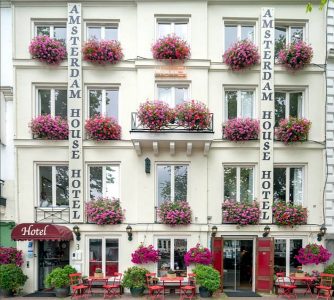Today Eyes on Animals visited a goat farm in North Brabant. We parked our car and headed towards the farmers’ home to introduce ourselves to the farmer. Because the windows of the stable were open, we could see inside the stable while walking towards the main door. We immediately saw that the condition in the stable was alarming. A significant proportion of the kids (20-30%) were dead. Many other of the kids were sick or severely weakened. Many had the infectious virus “sore jaws” with sore crusts and inflammation around the mouth. There was also a cadaver bucket filled to the rim with dead kids. Because the situation was so serious, we decided not to ring the door of the farmer and give advice – as we normally do – but immediately report our observations to the NVWA. The NVWA was on the spot a few hours later. They let us know that the condition inside was serious and they would “take immediate action”.
The reason Eyes on Animals visited this company is because the mortality among kids coming from the goat dairy industry is very high (between 15-30%) and they are transported when just a few days old. Unfortunately, the Transport Regulation 1/2005 does not specify a minimum age that kids must be when the journey is under 100km. And kids that are just 7 days of age are even allowed to be transported on really long journey. On the goat dairy farms, the male kids (born to keep milk production running) are “superfluous”. After all, they won’t give milk. They are therefore transported to so-called “goat fattening farms” a few days after birth. Here they are fattened for a few months after which they are slaughtered. About 150,000 male kids are born annually. How many exactly are being fattened is unknown. Male kids are also killed at the farm immediately after birth, or transported to southern Europe at the age of 1-2 weeks.
The mortality rate on goat fattening farms is so high because kids have almost no resistance. They are taken from the mother prematurely (immediately after birth) and often are given insufficient or no colostrum (first milk) at all, thus missing important antibodies. As well, on the fattening farms, kids coming from many different farms get mixed, causing them to be exposed to many new germs. In addition, very little medication is offered due to the costs. Medication often costs more than the value of the goats’ meat. Because they are often slaughtered at a young age (<4 months) there is also a chance that, when medicine is used, residues will be found in the meat. This is not permitted for public health reasons. This also decreases the use of medical treatment.
Eyes on Animals will further investigate the issue of the goat dairy and meat industry and, in consultation with the sector and controlling agencies, look at how to reduce the suffering of goats.
Update 2.06.2017
Both the TV show “Hart van Nederland” and news media “Oproep Brabant” have reported on this inspection of Eyes on Animals. Additionally, in reaction to the findings of Eyes on Animals, the NVWA (official Dutch government inspection agency) has announced that they will carry out extra checks on goat farms.
Check out the TV report on Hart van Nederland
Read the article from Broadcasting Brabant.



